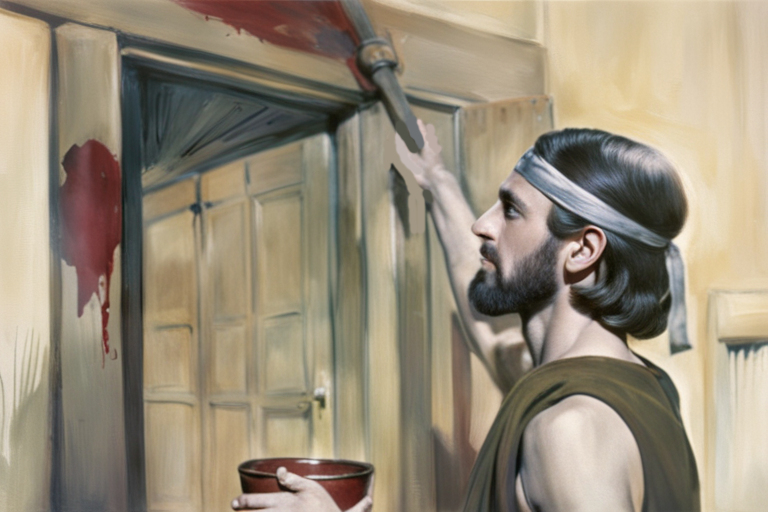“And I will make thee to pass with thine enemies into a land which thou knowest not:
for a fire is kindled in mine anger, which shall burn upon you.”
(Jeremiah 15:14)
Fire is often used in Scripture to represent the wrathful judgment of God. One such example is our text in Jeremiah 15:14, and others include the “fire of God’s wrath,” (Ezek. 21:31, 22:31), “… wrath like fire,” (Lam. 2:4, Nahum 1:6), and “burning anger,” (Zeph. 3:8).
The sacrificial system instituted by God in the Old Testament was comprised of five distinct offerings with specific instructions and purposes for each. Two of these offerings – the burnt offering (Lev. 1:3-17) and the sin offering (Lev. 4) – involved roasting the sacrifice over fire for the purpose of atoning for sin. It would be completely consistent with biblical symbolism, therefore, to consider this fire represents God’s wrath consuming that sacrifice in order to atone for the sins of the people presenting it.
One day while preaching to those who had gathered to hear his message, John the Baptist saw Jesus walking toward him. At that moment he shouted, “Behold the Lamb of God who takes away the sin of the world.” This statement is wrought with meaning, especially for the Jewish people who fully understood the significance of the sacrificial lamb under the old testament system. What they did not realize, however, was the grand and glorious significance of the soon sacrifice of this “Lamb of God” in terms of atonement for sin once for all (Heb. 10:10).
What does this have to do with Jeremiah 15:14? The answer is found again in the symbolism associated with the old testament sacrificial system, specifically as it relates to the annual Jewish celebration of Passover. The night before they would flee Egyptian bondage, the Israelites were instructed to sacrifice a lamb and sprinkle its blood on the two side posts of the door of their home. This sprinkling of blood ensured that the Angel of Death would “pass over” their home and they would be spared the death of their firstborn son that night (Exod. 12:23). The Jews were to then roast the slain lamb and to eat it in haste, for they were in the process of fleeing Egypt.
In similar fashion, while breaking the bread of Passover with his disciples the night before he is to be crucified, Christ tells them, “take, eat, this is my body,” (Matt. 26:26). And at another time, “unless you eat the flesh of the Son of Man… you cannot have eternal life within you,” (John 6:53). For Christ, the Lamb of God, was slaughtered to atone for our sins (Heb. 10:10).
The white-hot fire of God’s wrath for the sins of the world is observed in the degree of Christ’s sufferings in his passion and death. He was completely exposed and made vulnerable to the full extent of the consuming fire of God’s anger (Deut. 4:24; Heb. 12:29). And when the symbolism of the old testament sacrifice is overlaid on this new testament truth, we come to see that unless we personally partake of the slain Paschal Lamb who is roasted for us over the almighty fire of God, and we apply his blood to the doorposts of our heart, the fire of God’s wrath shall burn forever on us instead.
Contemplations:
- In the spirit of Passover, Christ is the sacrificed Lamb of God who was butchered and then roasted in the fire of God’s wrath, in the hell of his fury. “That the wrath of God, when it is greatly kindled, is extremely fierce, for it is a most dreadful thing to be under God’s wrath when it is once kindled.”[1]
- God’s wrath is an expression of his justice burning against sin and must be expiated by the atonement of Christ. It is denoted in Scripture as burning (Lev. 10:6; Deut. 32:22; Psalm 21:9), and a fire (2 Kings 23:26; Psalm 2:1; Isa. 30:27), described as hot (Psalm 58:9; Deut. 13:17; Job 20:23) and smoking (Deut. 29:27-28; Psalm 74:1).
- Lord, Scripture makes it clear that either the sinner continues to pay his own wages for sin by suffering the flames of hell forever, or he partakes of your substitutionary provision that removes the condemnation of death and hell from him. Either way, your justice is satisfied and your holiness honored.
- You have determined the only means by which men must be saved. “Neither is there salvation in any other: for there is none other name under heaven given among men, whereby we must be saved,” (Acts 4:12). Salvation comes from Christ alone, and his salvation is specifically stated to deliver his people “from the wrath to come,” (1 Thess. 1:10). Wrath is inevitable, and when it comes, it will be all consuming, “For the great day of his wrath is come; and who shall be able to stand?” (Rev. 6:17).
- How does God save sinners from his wrath? Jesus Christ made a covenant of peace with God (Zech. 6:13) to rescue His people from their sins which included taking on the form of a servant (Phil. 2:7-8), living a perfect sinless life to satisfy God’s Law (Heb. 4:15), willingly dying on the cross as a sacrifice for sin (Col. 1:20), rising to life after three days (1 Cor. 15:15), ascending to the Father (John 20:17), and presently interceding on behalf of his people as high priest (Heb. 10:21-22).
Further References for Jer. 15:14:
Jer. 17:4; Deut. 32:22; Psalm 21:9; Nah. 1:6
[1] Stephen Marshall, Reformation and Desolation, (Crossville, TN: Puritan Publications, 2016) Part 2.


